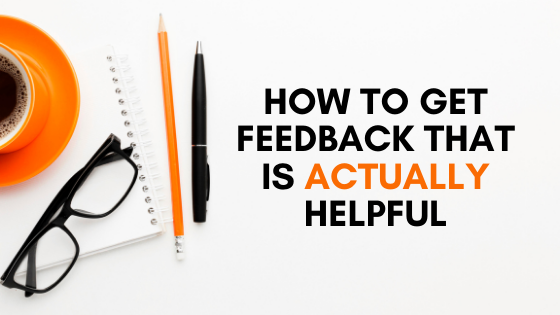How to get feedback that is actually helpful

Have you ever asked someone for feedback, for work or in your personal life, and when you got it, thought to yourself "Hmmm, that's not what I needed"?
If so, you're not alone! Today I’d like to share a top tip that I've found helps me get feedback that I can actually use every time!
From asking a friend to tell me what they thought about a new outfit to asking a client for feedback on the sketches I had drawn for their project, I can’t count all the times that I’ve asked for feedback and ended up a little bit disappointed or worse: frustrated, because I couldn’t really do much with the feedback I’d received.
After a while I started to wonder why that was. I never doubted that the people giving me feedback were trying their best but it started to feel like either other people were pretty bad at giving feedback (unlikely) or I was doing something wrong (more likely).
One day it finally clicked.
My boyfriend asked me to give him feedback on a piece of work he’d done and not knowing what aspect of it he wanted me to talk about, I started commenting on some very surface level (or generic) stuff. As I was talking I could see on his face that I wasn’t quite giving him what he needed. After a short while I paused for a moment and then asked: “What exactly do you want feedback on?” He suddenly lit up and told me what he needed help with. And then I lit up as well because I knew what to look at.
You see, when we get ‘bad’ or ‘unhelpful’ feedback a lot of the time it’s because we’re not being helpful ourselves. “What do you think?” is too broad a question and when we ask it, we take the risk of not getting the answers we need.
We have to do the heavy lifting. We have to be helpful and point the other person towards the areas that we want feedback on.
Now I know what you’re thinking: “But isn’t that influencing the other person in a way?”
It certainly directs the other person’s attention to a specific area but I don’t think it influences their answer.
What it does though is that it turns on the light, otherwise we’re essentially asking them to shoot in the dark, and often that means giving feedback on very generic things, i.e. the first things they can see or think of.
If we want a little bit of ‘free style’ or unguided feedback we can always ask (once we’ve pointed at what we need) a question like “Is there anything else you would like to comment on?” or “Did anything else come to mind?”
When we help the feedback giver and direct their attention towards what we want to know, we get two main benefits:
1) More often than not we’ll end up more satisfied with the feedback we get.
2) The person who gave us feedback will walk away with the confidence that they actually helped us, and they’ll be more satisfied too (don’t you feel happier when you KNOW you’ve helped someone?).
